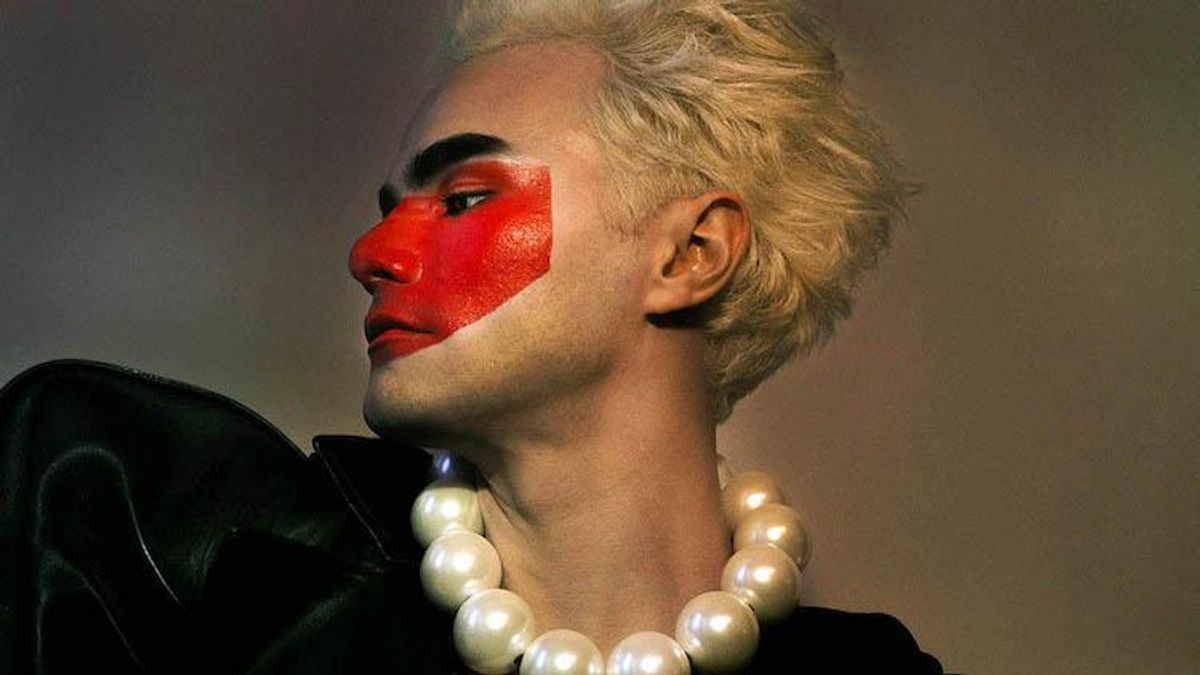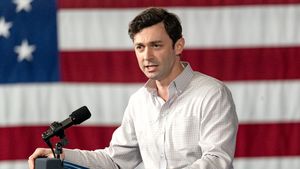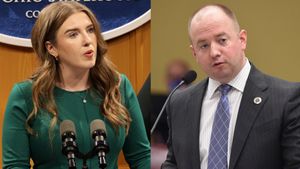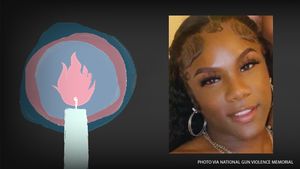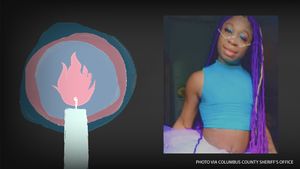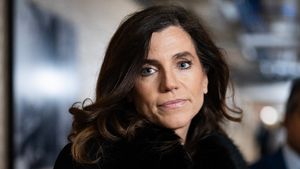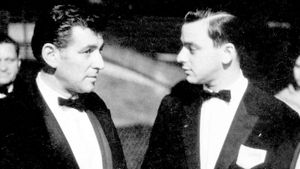Growing up in the small Argentinian city of Jujuy, singer, songwriter, and performer Baby Yors wasn't exposed to artists like Freddie Mercury or David Bowie. "They just weren't in the catalogue," the 26-year-old says. "My mom only listened to classical music and my dad listened to acts like Air Supply, Lionel Ritchie, and Neil Diamond. The singers I remember seeing were Madonna, Michael Jackson, and Britney Spears, who inspired me to want to start dancing." And yet, with his fearless theatricality, consistent androgynous look, and alternately guttural and high-pitched vocals, Baby (born Marco Palou) projects that distinctive, once-hallowed aura of queer and queer-adjacent icons like Mercury, Bowie, Prince, and George Michael. And with the recent loss of the latter three still fresh in the minds of all of us, Baby may just be someone who can help fill the void they left behind, even if that's not exactly how he sees it. "I definitely connect to those men in a very visual way, and I do think there's a gap in pop music that's missing people like them," he says. "But I don't think that necessarily happened when they died. I feel like that was already happening, because they're from a different generation. I haven't really seen a new 20-something male doing quite what they did. And while there may be people like Ricky Martin, I haven't seen a queer Latin artist like that ever."
Related | Gallery: Queer Latin Artist Baby Yors
Baby's adamant drive, his flair for the dramatic, and his need for artistic escapism all trace back to his youth in Jujuy, a place that, for him, is tied to countless memories of bullying and discrimination. As early as kindergarten, kids on the playground would call him a fag, including his own cousin. He even remembers teachers laughing along with the jokes. One classmate whose father was in the military told Baby he was going to bring a gun to school and kill him. And he kept virtually all of this hidden from his parents. "I was embarrassed," he says. "It became my secret. Because I didn't want my parents to think I was a fag either. And I was afraid because my parents had taught me that it was dangerous to speak up about things, and that I shouldn't stir the pot because the consequences could be huge." When Baby was about seven years old, and his mother caught him playing with Barbies, she burned them in front of him. And took him to see a psychologist. "It was traumatizing," he says, "but I know it came from fear. I know she felt powerless, especially in a small town where everyone knows each other and everyone's worried about what other people think. She wanted people to think she had a perfect son. But all of that just made this wall between me and the place I grew up in thicker and thicker."

Robe: Manzanares
To counteract this, Baby made it his mission to become a multifaceted prodigy, of sorts. In any way possible. From grade school on, he poured himself into the arts and also science, a lingering passion that continues to influence his work. Outside of his daily curriculum, he'd pack his afternoons, from 2 to 11 p.m., with salsa, tango, ballet, and jazz classes at three different musical theater schools. He was also taking art lessons and acting classes, and designing flyers for shows at a local production house. Urged on by his parents, he learned German, Italian, French, and English, and he took gymnastics--a sport his mom and dad supported largely because it was viewed as more masculine. "I always felt like everything that I did would make me a better artist," Baby says. "Since I was a boy, I wanted to get away and go to Hollywood. I wanted to be the biggest pop star in the world. And I felt that if I was able to do acting and also sing and dance and do all of these things with excellence, then something would work out."
Though he claims to have had virtually no friends ("I still get nervous and start sweating when a group of 13- or 14-year-old boys comes toward me," he says), Baby did find solace and companionship in his grandmother, on his mother's side. "You need at least one adult to completely believe in you and support you, and that was her," he says. "She lived in this huge house with dogs and cats and even chickens at one point, and she had the most amazing library--books on quantum physics, books questioning religion, books on philosophers. I would read these and talk about them with her and we would debate. She would treat me like an adult. She was also one of the first people to find out I was into guys, after finding a diary entry I wrote about two guys jerking me off." Throughout high school, Baby dated and slept with girls, and he says the interest and attraction was genuine, but he experimented with guys, too, without necessarily being explicitly out. "I just was who I was," he says. "I experienced things with guys and girls And it's not like I was faking it. I was truly into both. I don't like to define myself as something because it can feel like a door closed. Right now, I'm in a relationship with a guy, so I guess that defines me in a way, but my sexuality doesn't have to come attached to a whole set of other things."

Coat: House of Fluff, Pants: Andrew Morrison, Corset: Garo Sparo, Ear Cuffs: Chris Habana, Silver Gloves: Laurence and Chico, Black Gloves: Drome
By age 16, after gaining attention for a televised performance at an Argentinian festival in front of an audience of 30,000 (an event that helped legitimize his art in his parents' eyes), Baby followed a mentor to New York for a five-day trip, which he loaded with efforts to, as he says, "plant a seed." He reached out to numerous schools, and applied and auditioned at institutions like the American Ballet Theatre (ABT) and the American Music and Dramatic Academy (AMDA). The visit ended promisingly, and after returning to Argentina and living on his own in Buenos Aires for a time, Baby was eventually accepted to AMDA and invited back to ABT. Knowing the short shelf life of a ballet dancer, Baby opted for the former, packed his bags, and in October of 2010, commenced a pseudo-gypsy life familiar to so many New York artists. "I arrived three days before I started classes, with three giant suitcases, and booked a hotel in Harlem because it was cheap," he says. "When I got there, I found out that the hotel didn't actually exist--it was an abandoned building. Empty! So I found another cheap hotel before moving into AMDA's dorms on the Upper West Side.
AMDA allowed Baby to immerse himself in musical theater classes and perfect his English to make himself more marketable as an actor. It's also where he met Brooke, a fellow singer who became his girlfriend and, not long after, his wife. He'd fooled around with male students before the pair got together, but he says that didn't bother either of them. "We were a couple, partners--just two kids in a city that was new for us," he says. "We were both open-minded, supporting each other, loving each other, doing things together, and having the same taste in art and things like that. Soon her family became like my family." But just as AMDA eventually wasn't fulfilling what Baby saw for himself as an artist, its regimented structure stifling his taste for rebellion and free expression, the marriage didn't last either. After a year-and-a-half, roughly around the time Baby left AMDA behind, the couple divorced, leaving the Harlem apartment they'd shared. "We just grew apart," he says. "It ended organically, even if it was complicated. But we still keep in touch from time to time and I still wish the best for her."

Jacket: Studmuffin NY, Jumpsuit: Cheng, Sunglasses: Planet.i
And yet, amid a divorce came multiple births for Baby. His acting career began to pick up and he appeared as an extra or co-star in hundreds of projects, including the ABC show Smash. And while a botched, potentially fatal deviated septum surgery put that work on hold for a bit (an Argentinian doctor mistakenly left a wad of cotton in his nostril for months, temporarily deforming his nose), Baby eventually became a member of the distinguished Actor's Studio, and has since gone on to star in CBS's The Good Wife, The CW's The Carrie Diaries, and The Wolf of Wall Street. And, of course, there was music. As things were going south with Brooke, Baby was obsessively learning guitar, playing piano, and writing poetry, much of which has translated into songs. At 21, he created the pop persona Resh, a playfully devilish manifestation of the queer vibrance he'd suppressed in his youth, complete with a horn-like hairstyle and a frequently used red cape. With virtually no budget, he wrote all of his own songs (as he still does), and collaborated with friends, guerrilla-style, to shoot music videos, record tracks, create custom merch, and distribute his work into the world. Also a filmmaker with shorts and screenplays under his belt, Baby directed the video for his most popular Resh song, "Boys Cry More," which featured street choreography reminiscent of "Thriller," and directly reflected Baby's issue with societally imposed gender norms. "The song was about owning your femininity and how alienated I felt growing up because of all these things you're supposed to do as a man," he says. "You're supposed to be tough, you're supposed to be strong, you're not supposed to cry. In the video, I'm reborn, and it's above all that bullshit."
And then he was reborn again, artistically, this time as Baby Yors, a genre-defying soul-pop-rock renegade, with shades of everyone from Bowie and Etta James to Billy Idol and Janis Joplin. If Resh was about flexing creative muscles, this new incarnation is about truly putting them to use--and letting them flail about if necessary. "With Baby, it feels like I'm trying to communicate instead of trying to hit all the notes or give a perfect performance," Baby says, adding that the "Yors" in the new name implies that he wants the music to belong to the audience. "With live performances especially [which at this point have been held at New York venues like Le Poisson Rouge, Pianos, The Knitting Factory, and more], whatever I have lived through today or yesterday, or whatever's in my head, is going to come out. And hopefully felt by others. It is 100 percent instinctive. I don't warm up. I may or may not take a shot of alcohol before I hit the stage, or smoke a cigarette, and then I go and be myself. And if I forget a lyric, it's fine. It's still going to be special."

On Instagram, where Baby is followed globally by more than 60,000 users, he's generated a growing fan base that responds not just to his concert clips (such as one in which he was literally tattooed on his ribcage while singing live), but to his distinct appearance and style, signified most by his fierce black eyebrows, his cinched corsets, and his thick-heeled platform boots. Young queer kids have shared posts emulating his fashion, admirers of all stripes have submitted fan art, and even those struggling have found strength in what he projects. "A few months ago, a 14-year-old girl told me that thanks to me, she came out to her parents," Baby says, "and that she'd felt hopeless before that, which to me was so sad for someone so young." And yet, at the same time, Baby says he felt hypocritical in that moment, as it was only this month that the artist came out to his own father, on a WhatsApp call to Argentina. "It was the night before my birthday, and I was with my boyfriend, and I was just like, 'That's it. I'm going to face this.' And it was beautiful. He told me he couldn't do anything but support me. And I understand that I'm very lucky to have that because not everyone does."
Ultimately, the confession to his father was just another barrier that Baby has pushed out of his way. And just as he wasn't afraid to keep taking dance classes while being called a fag in school, he isn't afraid that his queer and sometimes sexualized image is going to affect his chances as a successful artist. "I'd prefer to be hated for something that I am than to be loved for something that I'm not," he says. "And in a way, I already feel successful because I create whatever I want. And in regard to sexualized elements, people watch porn every single day, and I feel like what I'm doing is not even close to that. Besides, women are so hyper-sexualized, every day, on every billboard. Why can't a man present that way? I hope that what I'm doing will take some of those taboos out, break down that hypocrisy, and transcend it. Most of all, I'd like everyone to be more open to understanding people who are different than they are. Like a theatrical, queer Latin male, for instance. And I hope that when people are at my shows or listening to my songs, like 'New York,' they can, for a least a little bit, leave the planet with me. And escape. And think."
Follow Baby Yors on Instagram at @babyyors, and discover more at BabyYors.com.
Photography: Andres Burgos
Styling: Brandon Garr
Hair: Keisuke Chikamoto
Makeup: Seiya Iibuchi
Styling Assistants: Kellen Mulcahy & Fabio Martin Quintas
Photographed on location in Penthouse 3 at 15 Renwick, New York.
Special Thanks: B Interior & Anthony DeWitt
(Featured Image): Jacket: Drome, Necklace: Laurence and Chico
